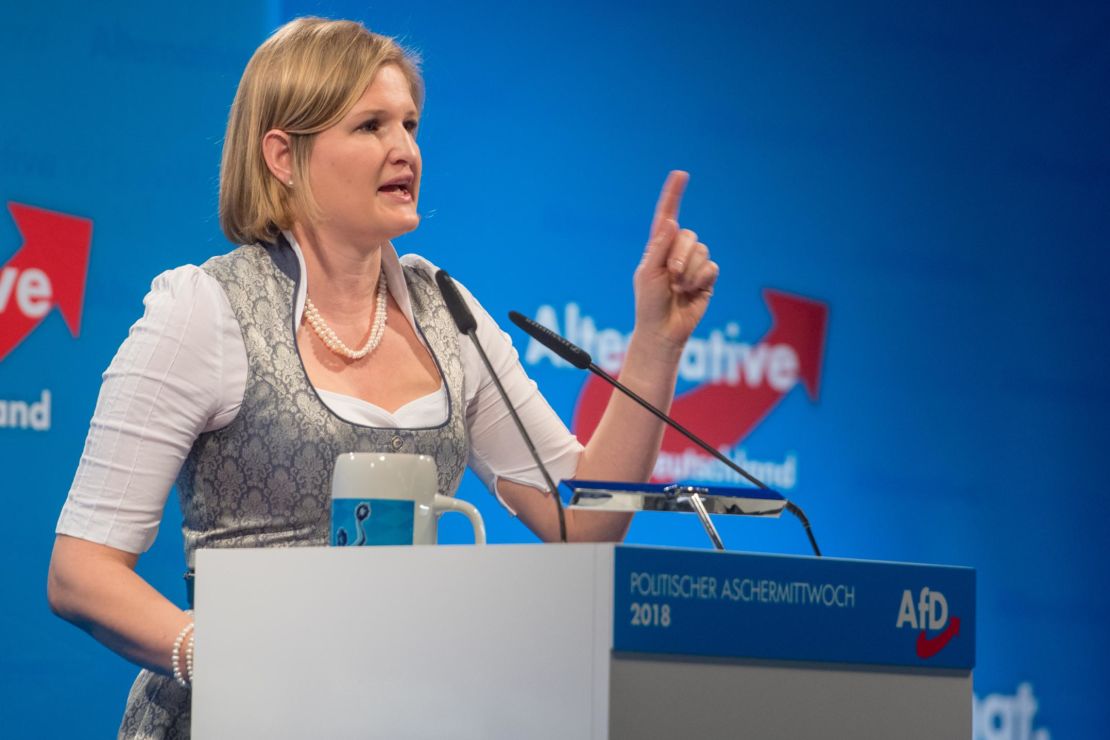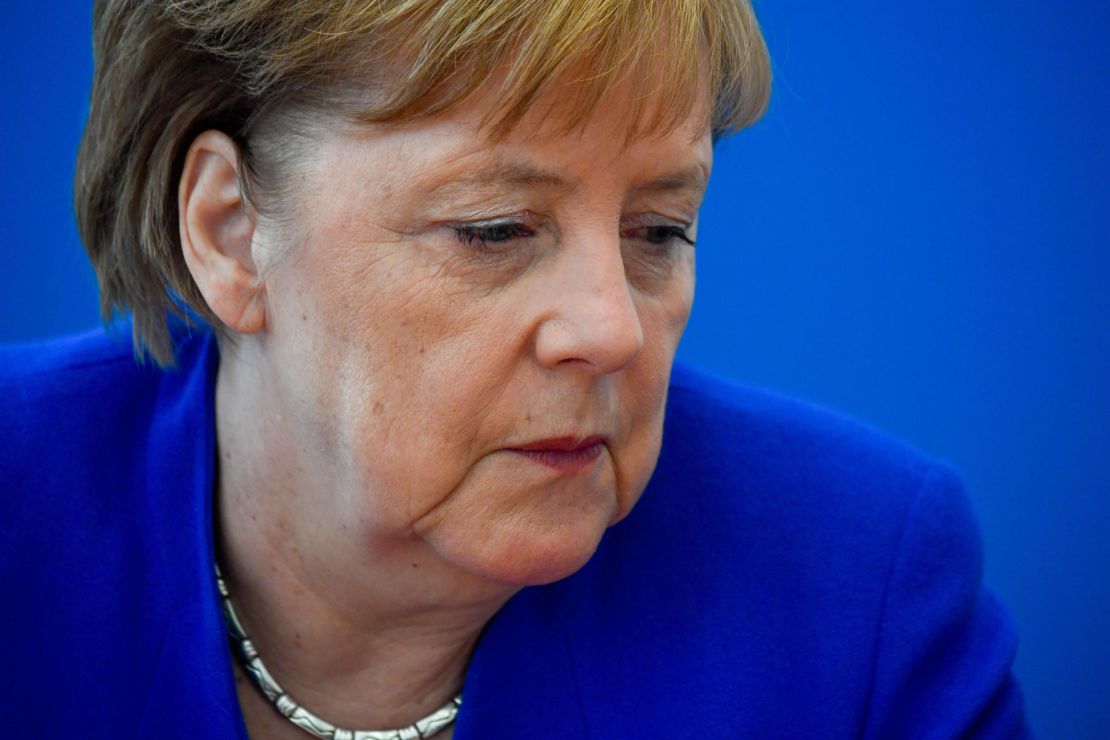One week before regional elections in Bavaria, Katrin Ebner-Steiner campaigns with an infectious smile, handing out leaflets to voters with slogans such as “Protect Our Wives and Daughters” or “Money for Pensioners Not Illegal Migrants.”
The peppy, 39-year-old mother of four is one of the leading candidates for the far-right, anti-immigration party, Alternative for Germany or AfD. In the national election last year, more than 19% of voters in her constituency of Deggendorf voted for the AfD – its biggest gain in west Germany. One local media outlet called her the “friendly face of populism,” a phrase that makes her laugh.
“It’s important to listen to people again. The old parties have forgotten how to do that,” she says pointedly. “People no longer feel understood. They don’t understand why our borders are broken. They don’t understand why the German media insists on labeling us in the AfD as a ‘Nazi’ party. All we want is to enforce law and order.”
Ebner-Steiner was speaking as Bavaria, home to Oktoberfest beer halls, bratwurst and lederhosen, is facing a possible seismic shift in elections on October 14 – one that could threaten Chancellor Angela Merkel’s increasingly fragile coalition government.
Since 1949, Bavaria has been dominated by one party, the conservative Christian Social Union or CSU – the sister-party to Merkel’s Christian Democratic Union (CDU). If the CSU falters in Bavaria, it will have repercussions in Berlin. With less than a week to go before the elections, polls show voters fleeing the center for the political fringes – from far-right nationalists to climate change warriors on the left.
To understand why voters are shifting, CNN visited the Bavarian town of Deggendorf where Ebner-Steiner is campaigning. Her AfD tent is pitched on the town square near a small beer garden. It’s decorated with giant photos of lederhosen and dirndl-wearing couples dancing the polka, including a beaming portrait of Ebner-Steiner in Bavarian dress.
“I come from a CSU family. My father was a CSU member. So was my husband for 30 years.” Now, she says, it’s time for a change. “People here have lost confidence in the CSU. The CSU always stood for conservative politics in Bavaria. That has changed. Munich may speak conservatively but in Berlin and Brussels they vote differently.”
For Ebner-Steiner there is one issue that tops them all: Immigration.
“This migration problem runs through all policy areas,” she says, ticking them off with her hand. “The housing shortage, problems in education. We have very low pensions and a rural exodus with no doctors in hospitals. These problems are all exacerbated by the migration crisis.”
In fact, Bavaria is one of the wealthiest parts of the country, a manufacturing hub home to BMW and Siemens. But it also bore the brunt of the 2015 refugee crisis in Germany.

That year, more than 1 million asylum seekers sought refuge in Germany, and most of these people crossed Bavaria’s borders from Austria. At first, Bavarians flocked to help in a humanitarian crisis. Deggendorf became a refugee transit center, with hundreds of people housed in a dormitory and scores more camped outside in tents.
“The area around Deggendorf shouldered much of the crisis,” explains Bernd Sibler, the CSU candidate in the town. “Bavaria is the corner of Germany through which 10,000 people came on a daily basis. We had to provide food, shelter and administration. After the first six weeks, people were exhausted.”
A pledge to control immigration is now one of the CSU’s main policies, while the refugee shelter has become an “anchor center” – a place to process migrants who cross the border more quickly, either deporting or relocating applicants. The tents are gone but there are still about 600 asylum seekers housed here, according to the Federal Office of Migration.
”We have solved a lot of the problems in Bavaria but not a lot of people have realized this yet,” Sibler insists. “This year, for example, we have had only about 15,000 refugees crossing the Bavarian border and at the same time we have carried out deportations and pushed voluntary repatriations. These results are [due to] our very own policies. It is the CSU who has done this.”
But voters CNN spoke to in Deggendorf seemed unsure of which party to vote for.
Georg Wimbauer, a 79-year old pensioner said the AfD was not an option for him: “Their refugee policies are too brutal. All refugees out? No, you cannot do this. You cannot send people away when they have no opportunities elsewhere,” he said. “But we also must not dismiss the AfD. They could eventually be in power. I would not like that at all. We already had one Hitler – we do not want this a second time.”
But another woman, who declined to give her name, felt the CSU had done little to stem immigration: “The AfD could do well this time. I’m not 100% for them but I have no other choice,” she said. “If there was any other party, I would not vote for them but there is none!”
CSU party leader Horst Seehofer has tried to regain conservative voters. This month, he pushed through a “Migration Master Plan” after a showdown with Chancellor Merkel, turning back at the border asylum seekers who have already registered in another European Union country. But earlier this year, the CSU was mocked for ordering Christian crosses to be fixed in the entrance halls of public buildings in Bavaria. None of this helped CSU poll numbers, to the delight of AfD candidates such as Ebner-Steiner.
“The CSU is basically our best campaigning body!” she laughs. “They try to take over our issues, they take on our rhetoric and look what happens. I can only say thank you CSU for your campaign support!”
Not all disillusioned voters are turning to the right, though. The Greens party in Bavaria has surged in recent polling. Earlier this month, in the midst of the Oktoberfest festival, about 20,000 demonstrators came out in Munich to protest the CSU’s tougher immigration policies.

Ingrid Walo, a 52-year-old Munich retail worker, shares these concerns. “Populism is the most important issue this election,” she told CNN in one of Munich’s Oktoberfest tents. “‘Heimat’ means home and heart. I am a Munich girl and this is my ‘heimat.’ Of course, you want to keep your home as it is but we also know it cannot stay that way for ever. We need to strike a balance and be cosmopolitan. To see ‘heimat’ as only Bavarian is no longer possible.”
Election-watchers will be scrutinizing the results coming in on Sunday night. The CSU may maintain its lead position but still lose enough votes to force it into a coalition. If that happens, the party leadership may be forced to resign – weakening Merkel’s cabinet and the tenuous support she has within her party. A week later, voters will go to the polls in Hesse – previously a solidly CDU voting region that may also see votes going to the fringes.
“These regional elections show that that the CSU and the CDU are going down the same road. They are losing support in their strongholds. And this is now contributed directly to Merkel,” says political scientist Timo Lochocki. “The pressure is rising and there are more forces within the party saying: She has to step down. We can’t win with her any more.”
In Deggendorf, the AfD’s Ebner-Steiner is optimistic. As we say goodbye, she cheerfully sends us off with a campaign message: “If you want Merkel to fall, start by casting your vote in Bavaria!”






